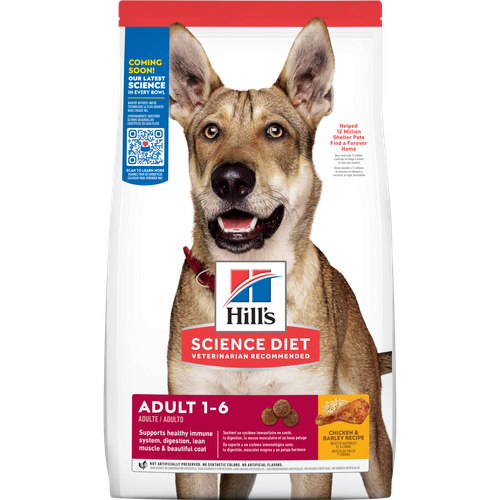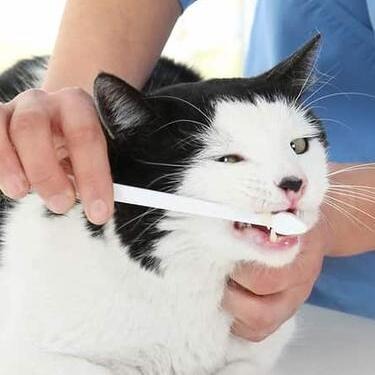
-
Find the right food for your petTake this quiz to see which food may be the best for your furry friend.Find the right food for your petTake this quiz to see which food may be the best for your furry friend.Featured products
 Puppy Lamb Meal & Brown Rice Recipe
Puppy Lamb Meal & Brown Rice RecipeVital nutrients to support 5 essential building blocks for lifelong health
Shop Now Adult Small & Mini Lamb Meal & Brown Rice Recipe Dog Food
Adult Small & Mini Lamb Meal & Brown Rice Recipe Dog FoodFor the faster metabolism of Small & Mini dogs
Shop Now Adult Chicken & Barley Recipe Dog Food
Adult Chicken & Barley Recipe Dog FoodSupports lean muscle and beautiful coat for adult dogs
Shop NowFeatured products Hill's Science Diet Adult Sensitive Stomach & Skin Chicken Recipe Dog Food
Hill's Science Diet Adult Sensitive Stomach & Skin Chicken Recipe Dog FoodHighly digestible recipe, gentle on stomachs. Nourishes skin & promotes a lustrous coat
Shop Now Adult Indoor Chicken Recipe Cat Food
Adult Indoor Chicken Recipe Cat FoodSupports energy level and beautiful fur in indoor cats
Shop Now Adult Chicken & Barley Recipe Dog Food
Adult Chicken & Barley Recipe Dog FoodSupports lean muscle and beautiful coat for adult dogs
Shop Now -
Dog
- Dog Tips & Articles
-
Health Category
- Weight
- Food & Environmental Sensitivities
- Urinary
- Digestive
- Joint
- Kidney
-
Life Stage
- Puppy Nutrition
- Adult Nutrition
- Senior Nutrition
Cat- Cat Tips & Articles
-
Health Category
- Weight
- Skin & Food Sensitivities
- Urinary
- Digestive
- Kidney
-
Life Stage
- Kitten Nutrition
- Adult Nutrition
Featured articles My Pet Ate a Lizard — What Should I Do?
My Pet Ate a Lizard — What Should I Do?Learn what to do if your pet eats a lizard, including whether they can be toxic and symptoms to keep an eye on when they've swallowed one.
Read More Pet Dental Health: What Happens During a Deep Teeth Cleaning?
Pet Dental Health: What Happens During a Deep Teeth Cleaning?Learn about veterinary dental care for your pet, including deep teeth cleaning procedures, which can help your dog or cat maintain proper dental health.
Read More Virtual Vet Visits: What You Need to Know
Virtual Vet Visits: What You Need to KnowLearn the ins and outs of a televet appointment before you talk to a vet online.
Read More -


Related Image Content
What causes cancer?
In many ways, your dog is a lot like you. You both need the basics of proper nutrition and exercise to stay active and healthy. The bad news: Dogs can develop cancer, just like humans. The good news: Dogs have cancer treatments, just like humans.
Cancer generally arises from a single cell that has undergone a series of genetic mutations. Many environmental agents are capable of inducing changes in cells – viruses, chemicals, radiation, ionizing radiation and some hormones. The effects of many of these agents accumulate over a lifetime, possibly explaining why many cancers affect middle-aged and older dogs.
To help prevent cancer, be aware of your dog's risks so you can be proactive in keeping him healthy.
The risk factors for cancer in dogs include:
- Age - Dogs are living longer, which increases the likelihood of cancer
- Breed and Size - Certain kinds of cancer are more common in specific breeds such as German shepherd, Scottish terriers and golden retrievers. Some bone tumors are more common in dogs weighing more than 20 kg.
- Gender - Some cancers are more common in one sex compared to another, such as mammary tumors in female dogs
- Environment - Exposure to chemicals, such as pesticides or herbicides, may contribute to cancer
Does my dog have cancer?
- Your veterinarian may need to perform several tests to establish a diagnosis, determine which organs are affected, and determine which therapy is best for your dog. The signs of cancer may include:
- Abnormal swelling that grows or persists
- Rapid or extreme weight loss
- Ongoing and persistent sores
- Significant change in appetite
- Chronic bleeding or discharge from the mouth, nose, ears or anus
- Offensive odor
- Difficulty swallowing or eating
Other common symptoms include lack of interest in exercise, loss of stamina, persistent lameness or stiffness, breathing difficulties and difficulty going to the bathroom.


Tasty Tips
Treatment and the importance of nutrition
Early detection of cancer is the single most important factor for successful treatment. Many cancers may be managed with chemotherapy and this can reduce the severity of clinical signs and add quality to your dog’s life. Many dogs debilitated and who have undergone surgery benefit from dog foods with increased levels of protein and energy to help correct nutrient deficiencies and replenish body nutrient storage. The main goal of nutritional management for cancer is to markedly improve the success of cancer therapy and add to the survival time and quality of life for dogs with cancer.
The food your dog eats plays an important role in his overall health and well-being. Balanced nutrition is an essential part of an active, healthy lifestyle. When your dog has cancer, it’s even more important to feed the right dog food consistently. For accurate diagnosis and treatment options, always consult your veterinarian and ask them to recommend the best food for your dog’s cancer.
Questions to Ask Your Veterinarian about Cancer in Dogs
- What are the treatment options for my dog’s cancer?
- Ask how nutrition works with other available options
- Should nutrition be a part of my dog’s treatment regimen? Would you recommend a Hill’s® Prescription Diet® dog food for my dog’s cancer?
- What if I have multiple dogs? Can I feed them all the same dog food?
- How can nutrition help? What is the benefit of feeding therapeutic nutrition as part of treatment which may include administering pills, shots or chemotherapy?
- What are the pros and cons of using nutrition to help manage my dog’s cancer?
- How long will I need to feed the recommended dog food to my dog?
- Ask how feeding a therapeutic dog food can help promote health for my dog with cancer
- What is the best way (email/phone) to reach you or your hospital if I have questions?
- Ask if you need a follow-up appointment.
- Ask if a reminder email or notice will be sent.


One of our staff authors prepared this article for you
Related products

Supports lean muscle and beautiful coat for adult dogs

Supports energy level and beautiful coat in mature dogs who prefer smaller kibble

Vital nutrients to support 5 essential building blocks for lifelong health

For the faster metabolism of Small & Mini dogs
Related articles

Learn about Hill's puppy food and the nutritional benefit & high quality ingredients that it contains for your pup.

Your dog's coat and skin are a big part of your dog's overall health. Ensure you keep your dog's coat healthy, by following these simple tips.

Discover how the field of dog science is giving us more and more insights into the inner workings of our furry best friends.

Proper nutrition for your pregnant or nursing dog is vital to her and her puppy's health. Learn what you should do provide her with the proper nutrients.

Put your dog on a diet without them knowing
Our low calorie formula helps you control your dog's weight. It's packed with high-quality protein for building lean muscles, and made with purposeful ingredients for a flavorful, nutritious meal. Clinically proven antioxidants, Vitamin C+E, help promote a healthy immune system.
Put your dog on a diet without them knowing
Our low calorie formula helps you control your dog's weight. It's packed with high-quality protein for building lean muscles, and made with purposeful ingredients for a flavorful, nutritious meal. Clinically proven antioxidants, Vitamin C+E, help promote a healthy immune system.

